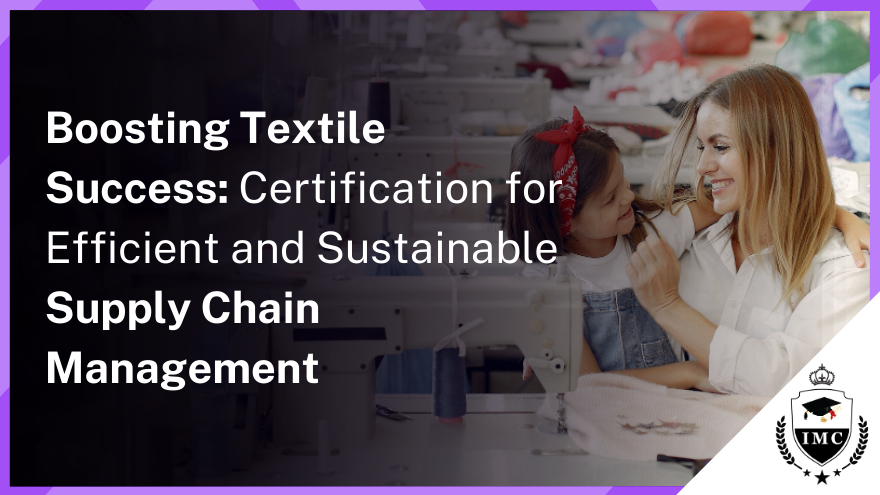The textile industry is a global and complex network, with supply chains stretching across continents and involving numerous stakeholders. Optimizing supply chain management in this industry is crucial for ensuring efficiency, sustainability, and customer satisfaction. Supply chain management certification provides professionals in the textile industry with the knowledge and skills necessary to navigate the intricacies of this dynamic sector. In this article, we delve into the significance of supply chain management certification for the textile industry, exploring its benefits, essential skills and knowledge, and the career opportunities it unlocks.
Benefits of Supply Chain Management Certification for the Textile Industry:
Enhanced Efficiency and Cost Optimization:
A supply chain management certification equips professionals with the expertise to streamline operations, reduce lead times, and optimize inventory levels. By leveraging their knowledge of Supply chain best practices, certified professionals can identify and eliminate inefficiencies, leading to improved cost control and operational efficiency.
Improved Quality and Customer Satisfaction:
A robust supply chain is essential for ensuring the quality of textile products and meeting customer expectations. Certified professionals can implement rigorous quality control measures throughout the supply chain, minimizing the risk of defects and ensuring that products meet the highest standards of quality. This translates into increased customer satisfaction and loyalty.
Sustainability and Environmental Impact Reduction:
The textile industry faces growing pressure to reduce its environmental impact and adopt sustainable practices. Supply chain management certification provides professionals with the knowledge and tools to implement sustainable supply chain strategies, such as reducing waste, optimizing transportation routes, and sourcing materials from environmentally responsible suppliers.
Risk Mitigation and Resilience:
The textile industry is exposed to various risks, including supply disruptions, fluctuating demand, and geopolitical uncertainties. Supply chain management certification provides professionals with the tools and knowledge to identify, assess, and mitigate these risks, building a resilient and agile supply chain that can withstand disruptions and ensure uninterrupted operations.
Strengthened Collaboration and Communication:
Effective supply chain management requires seamless collaboration and communication among various stakeholders, including manufacturers, suppliers, and logistics providers. Certified professionals can foster collaboration, facilitate information sharing, and coordinate activities across different functions, promoting alignment and optimizing supply chain performance.
Career Advancement and Recognition:
Obtaining a supply chain management certification demonstrates a commitment to professional development and expertise. It sets certified professionals apart, enhancing their employability and promoting career advancement opportunities. The certification serves as a valuable credential, recognized by employers and industry peers, indicating a high level of competence and knowledge in textile supply chain management.
Essential Skills and Knowledge for Supply chain management Professionals in the Textile Industry:
Supply Chain Planning and Forecasting:
A thorough understanding of supply chain planning and forecasting techniques is essential for anticipating market demand, optimizing production schedules, and ensuring the availability of the right products at the right time.
Inventory Management and Logistics:
Expertise in inventory management, warehousing, and transportation is crucial for minimizing carrying costs, optimizing stock levels, and ensuring timely delivery of products to customers.
Supplier Management and Procurement:
Strong negotiation skills and the ability to evaluate and select reliable suppliers are vital for securing favorable terms, managing vendor relationships, and ensuring the quality of procured materials and components.
Quality Control and Assurance:
Knowledge of quality control and assurance methodologies is essential for implementing effective measures to prevent defects, monitor product quality, and ensure compliance with regulatory standards.
Data Analysis and Decision-Making:
The ability to analyze supply chain data, identify trends, and make informed decisions is critical for optimizing operations, identifying inefficiencies, and driving continuous improvement.
Sustainability and Environmental Impact Assessment:
An understanding of sustainable Supply chain practices and the ability to assess the environmental impact of supply chain activities are becoming increasingly important for professionals in the textile industry.
Career Opportunities for Professionals with Supply chain management Certification in the Textile Industry:
Supply Chain Manager: Certified professionals can assume leadership roles as Supply Chain Managers, overseeing the planning, coordination, and execution of supply chain activities, ensuring the smooth flow of products and services.
Logistics Manager:
Professionals with expertise in logistics can excel as Logistics Managers, responsible for managing transportation, warehousing, and distribution operations, ensuring timely and cost-effective delivery of products.
Procurement Manager:
Individuals with a strong background in procurement can pursue roles as Procurement Managers, responsible for sourcing raw materials, negotiating contracts, and managing supplier relationships, securing favorable terms and ensuring the quality of procured materials.
Quality Assurance Manager:
Certified professionals with a focus on quality assurance can pursue roles as Quality Assurance Managers, responsible for developing and implementing quality control systems, conducting audits, and ensuring adherence to regulatory requirements.
Sustainability Manager:
With the growing emphasis on sustainability, professionals with expertise in sustainable supply chain management can pursue roles as Sustainability Managers, responsible for developing and implementing sustainability strategies, reducing environmental impact, and ensuring compliance with regulations.
Supply Chain Consultant:
With specialized knowledge and expertise, certified professionals can provide consulting services to textile companies, helping them optimize their supply chains, improve compliance, and achieve operational excellence.
Summary
Supply chain management certification is a valuable investment for professionals working in the textile industry. By acquiring specialized knowledge and skills, certified professionals can drive operational excellence, enhance efficiency, reduce costs, improve quality, mitigate risks, and promote sustainability. The certification opens up new career opportunities, demonstrates a commitment to professional development, and positions individuals as leaders in the ever-evolving textile industry. IMC Institute is Your Gateway to Supply Chain Management Certification At IMC Institute, we offer a comprehensive Supply Chain Management Certification program designed to equip professionals with the skills and knowledge necessary to excel in the textile industry. Our program covers a wide range of topics, including supply chain planning, inventory management, logistics, supplier management, quality control, and sustainability. With a focus on practical application and real-world scenarios, our program prepares individuals to effectively address the challenges and opportunities of the textile supply chain. Join us and take the next step in your professional development, becoming a certified supply chain management professional in the textile industry






